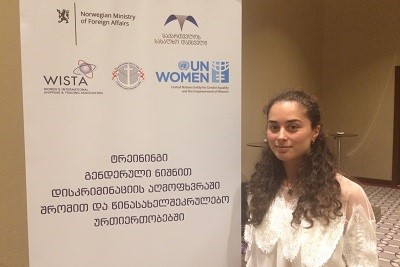UN Women and partners engage maritime companies in discussion on gender-based discrimination
Date:
Eighteen representatives of maritime sector companies and training institutions gathered in the port city of Batumi to improve their knowledge on gender-based discrimination.

A collaborative effort between UN Women and the Public Defender’s Office, as well as the Maritime Transport Agency and the Women’s International Shipping and Trading Association Georgia, the training aimed at introducing gender concepts and addressing various forms of sexual harassment and gender-based discrimination, including in recruitment. Topics that generated robust discussion included the minimum entrance criteria at specialized training institutions and the equal treatment of not only employees but also company clients.
Natia Labadze, one of the few female seafarers in Georgia, also attended the training. When she graduated from the Maritime Academy, she was the only woman out of the 157 graduates. Natia initially faced challenges in finding a job at sea because many job advertisements only called for male applicants. “It is important to set examples that it is possible to have women in the industry,” she stressed. “I want to share my experiences with others working in the sector.”
Jenni Ratilainen, UN Women Programme Specialist at the training, noted: “We have trained companies on gender issues in Georgia before, but this is the first time we have organized a sector-specific training. This training is just the first step, but we hope that it will already motivate companies to think about how to make the sector more friendly and appealing to women.”
Historically the maritime industry has been perceived to be a “man’s domain”, and the representation of women has remained low. Attracting a more gender-diverse workforce is, however, a way to address the increasing shortage of new talent in the industry. The BIMCO/ICS Manpower Report 2015 states that the industry is facing a labour shortage of about 16,500 seafaring officers across the world. The report warns that by 2025, the industry could be missing as many as 147,500 officers to its labour force.
The training in Batumi was part of the project “A Joint Action for Women’s Economic Empowerment in Georgia” funded by the Norwegian Ministry of Foreign Affairs. The project contributes to the achievement of the Sustainability Development Goals in Georgia through strengthening the private sector’s engagement in the promotion of women’s economic empowerment.